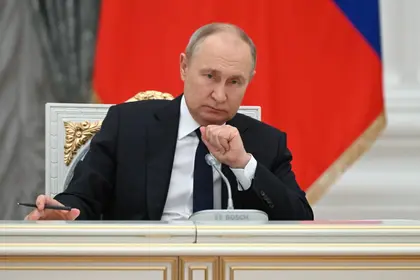Russian President Vladimir Putin doubled down on his maximalist and purposefully vague territorial objectives in Ukraine on Jan. 31.
Putin stated during a meeting with his election “proxies” that pushing the current frontline deeper into Ukraine is the most important goal for Russian forces across the theater. He emphasized the idea of a “demilitarized” or “sanitary” zone in Ukraine that he claimed would place Russian territory – including occupied Ukraine – out of range of both frontline artillery systems and Western-provided long-range systems.
JOIN US ON TELEGRAM
Follow our coverage of the war on the @Kyivpost_official.
Putin’s stated goal of pushing the front line so that Russia’s claimed, and actual territories are outside of Ukrainian firing range is a vague goal that is actually unattainable as long as there is an independent Ukraine with any ability to fight.
Putin would likely annex any Ukrainian territories Russia managed to capture in pursuit of this supposed objective (particularly in the four oblasts Russia has already claimed to have annexed but only partially controls), thus bringing the new Russian territories into range of Ukrainian systems in whatever remains of an independent Ukraine.
A Russian nationalist milblogger expanded on this dilemma, noting that Russia would also have to capture Mykolaiv and Odesa cities to eliminate the threat of Ukrainian long range strikes against occupied Crimea and that Russian forces would need to capture the Slovyansk-Kramatorsk line in Donetsk Oblast to relieve the current front line.

Trump Makes 90 Day Foreign Aid Freeze – Ukraine Military Support Supposedly Untouched
The milblogger notably suggested even further territorial expansion by asking whether Russia wants Slovyansk to ”bear the fate of an eternally frontline city.”
Putin’s Jan. 31 statements do not represent significant inflections in Russia’s stated war aims or actual military capabilities but are rather likely intended to capitalize on existing narratives in Western media that could block short and long term Western military assistance to Ukraine and compel the West to negotiate with Russia on Russian terms.
Putin also included Kharkiv City, which he has previously described as “Russian,” in this hypothesized demilitarized zone, likely to capitalize on discussions surrounding the unlikely possibility of a Russian offensive effort along Kharkiv Oblast’s northern border from Belgorod Oblast.
Putin may intend to amplify these discussions to divert Ukrainian attention away from the ongoing Russian offensive operation along the Kharkiv-Luhansk Oblast axis, but ISW continues to assess that Russian forces in Belgorod Oblast can conduct only tactical-level actions that would serve as feints to draw and fix Ukrainian forces along the border.
Putin is also likely trying to appeal to resurgent calls from Russian ultranationalists to create a ”buffer zone” between Kharkiv and Belgorod oblasts to push Ukrainian MLRS and artillery away from the international border with Belgorod Oblast.
Putin previously claimed that he would consider creating such a “buffer zone” during widespread discontent about limited cross border raids by pro-Ukraine forces into Belgorod Oblast in summer 2023, but the Russian military has yet to take any actions that suggest that Putin has seriously considered these calls.
Putin also highlighted the Russian offensive effort near Avdiivka likely to portray that effort as successful to domestic Russian audiences and to further justify the Russian war in Ukraine.
Putin claimed that the “Veterany” Assault Brigade (Volunteer Assault Corps) fought ahead of regular Russian forces, broke through Ukrainian lines, and captured 19 houses near Avdiivka, which Putin characterized as one of the most important areas of the frontline. Putin stated that the “Veterany” Brigade “fights properly” and should be “educating young people.”
Putin also reiterated boilerplate narratives that the Russian war in Ukraine is a struggle for Russian sovereignty that is purging Russian society of those who are against this sovereignty, thus unifying Russian society.
Reprinted from ISW Russian Offensive Campaign Assessment, Jan. 31, 2024. See the original here.
You can also highlight the text and press Ctrl + Enter










